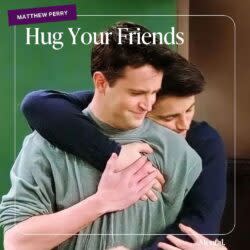Why Friends Are So Important to Your Mental Health

The untimely passing of Friends star Matthew Perry likely has you thinking about two things: 1) your friends and 2) how you haven’t been making enough time for them.
We need our friends more than ever these days. We’re in the midst of a loneliness epidemic, according to the U.S. Surgeon General, and friendships may be the most overlooked and underprescribed treatment for anxiety and social isolation. Feeling nervous? Anxious? Depressed? The science is clear: See one friend and call us in the morning.
Yet, your friendships likely aren’t your most solid relationships these days, another COVID casualty that hasn’t gotten enough attention.
Jump back to 2020 for a second. Between mid-Feb and mid-March that year, prescriptions in America for antidepressant, anti-anxiety, and anti-insomnia meds increased 21 percent—and a whopping 78 percent of scripts filled during that peak COVID week in March were new ones.
As our mental health crumbled and Rx meds spiked, another wellbeing essential, our social circles, began disappearing—particularly among young women. According to one survey, approximately 41.5 percent of women ages 18-49 lost touch with a few friends over the 12 months between 2020 and 2021, and 14.5 percent said they’d become incomunicado with most of their friends.

This is bad news bears. Period. Because strong bonds impart all kinds of worthy benefits. Research shows that being part of a social group boosts self-esteem and lessens loneliness, with one study suggesting “interpersonal interventions” as a means to decrease symptoms of depression (signs of depression can show up in your body too, not just your brain.)
It’s Coming From Inside The…Brain
Why and how can friends influence depression? It starts in the brain. Particularly in the amygdala, the area that susses out threats and regulates emotion. “The amygdala senses for safety,” says therapist Patrick Davin, LPC. “When you feel safe, [the neurotransmitter] GABA is released, your nervous system is calm, the bond is felt, and there is minimal anxiety. Less cortisol, less stress. We want to feel open and calm. At least that’s the optimal goal, right? Friendship is one way for that to happen.”
Speaking of stress, it can actually strengthen friendships in women. “Studies have found women’s brains are wired to seek out connection, particularly if one person is experiencing some form of distress,” says psychologist and relationship coach Jaime Zuckerman, Psy.D. To wit, one study published in the journal Psychological Review found that in women but not men, stress triggered the release of oxytocin, otherwise known as the “love hormone,” prompting women to “tend and befriend.”
GOTTA READ: 5 Surprising Physical Symptoms of Anxiety
“Women tend to relate to one another on a more emotional level,” says Dr. Zuckerman. “They tend to share more of a common bond as women in society. They just get each other.”
And yet when the pandemic forced people to hole up alone, many moved states away—uprooting friendships along with homes. Avoiding COVID meant avoiding other humans, and this, says Davin, changed the “matrix” of life. “Routine was broken up,” says Davin, who has a private practice in Greenwich, Connecticut. “The less you are exposed to socializing situations, the more social anxiety builds.”
The Profound Power of Pals
We’re still feeling the ramifications of those lockdown times. “You’re not in practice, and it becomes somewhat foreign. You get comfortable in the cocoon. The safe amygdala says, Yes, this is nice,” Davin explains. “You’re home on your phone on social media and steaming stuff so you’re entertained, but it’s a trap.” A trap that may require less effort but comes with a major loss: the anxiety-reducing, laughter-provoking joys of friendship.
And, even more crucial, the life-affirming power of friendship. A 2020 review of studies published in Neuroscience & Behavioral Reviews suggests that social isolation may be linked with inflammation, an effect that can negatively impact almost every bodily system.
GOTTA READ: Your Inner Child Is Calling—Should You Pick Up?
Another study connected friendships with a long life. An absence of social relationships, it found, was just as important to longevity as known mortality-crushers like smoking and alcohol consumption—and lacking friends was even more harmful than things like physical inactivity. “The media,” the authors wrote, “should take social relationships as seriously as other risk factors that affect mortality.”
Heard! Acknowledged! On it!
So…how can we nurture our floundering friendships? “Everyone shows and receives love and support differently. It’s important to know how you and your friend seek support,” says Dr. Zuckerman, founder of The Z Group in Ardmore, Pennsylvania. “Ask them what they need. Ask them how you can help. Tell them you’re here if they need you. Tell them you love them. Or just simply sit with them in silence.”
It’s important, she says, to match your efforts to their style. “Sometimes something as simple as a card in the mail saying hello and you’re thinking of them.”
If Perry’s death reminds us of anything, it’s that life is short—always make time for your friends.
READ NEXT: How Emotionally Reactivity Can Hurt Your Friendships
The post Why Friends Are So Important to Your Mental Health appeared first on Mental.

